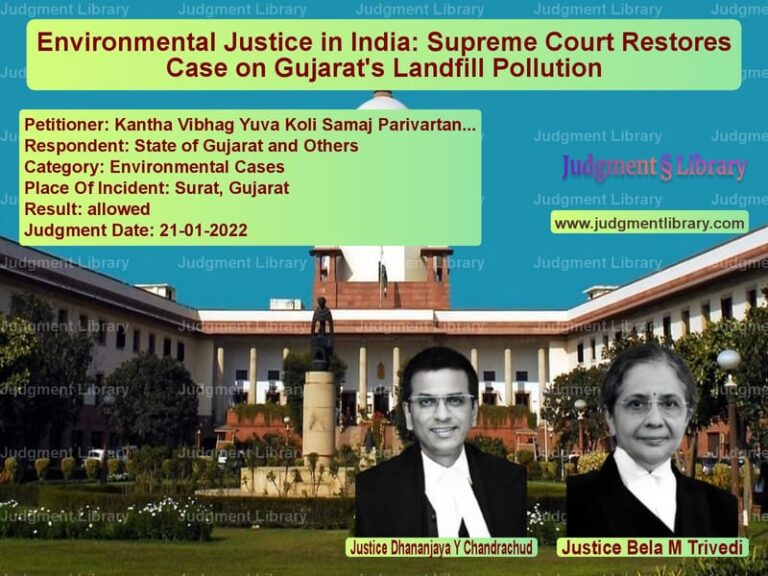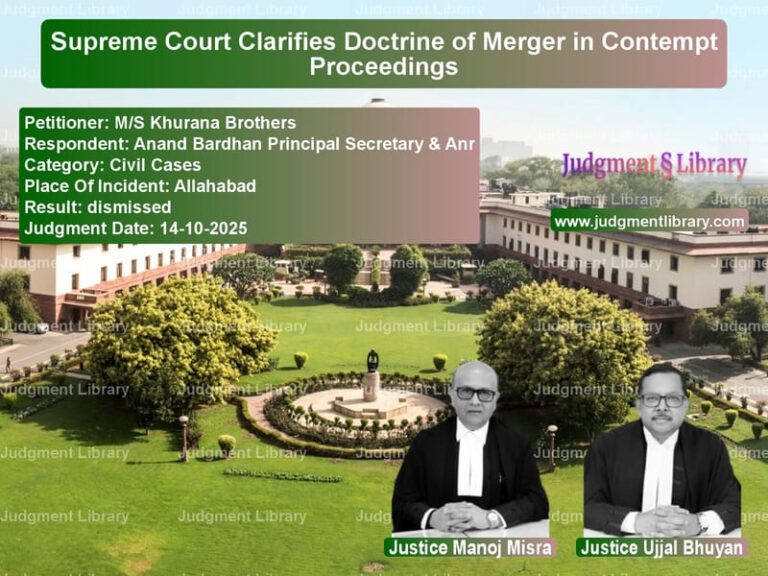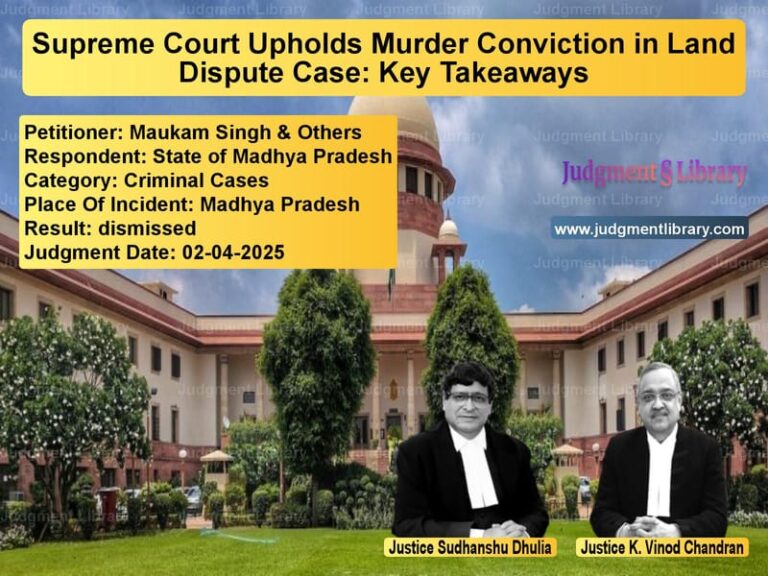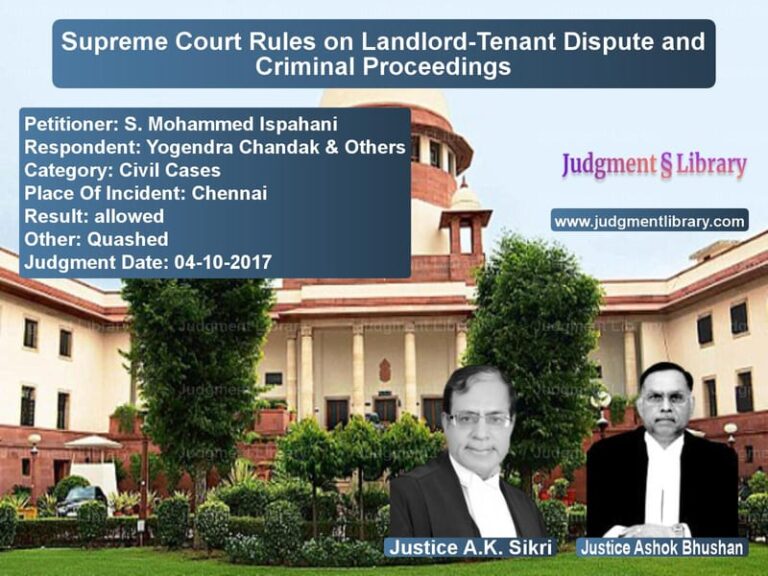CENVAT Credit and Fuel Inputs: Commissioner of Central Excise vs Gujarat Narmada Fertilizers
The present case deals with the issue of whether an assessee is entitled to claim CENVAT credit on duty-paid Low Sulphur Heavy Stock (LSHS) used as fuel in the manufacture of exempted goods, particularly fertilizers. The Commissioner of Central Excise, Vadodara filed an appeal against the Gujarat Narmada Valley Fertilizers Co. Ltd., challenging the CENVAT credit claimed by the company on LSHS used for generating steam and electricity for the manufacture of fertilizer, which is exempt from excise duty.
Key Facts of the Case:
- The assessee (Gujarat Narmada Fertilizers Co. Ltd.) utilized CENVAT duty-paid LSHS as fuel to generate steam, which was then used to generate electricity for manufacturing fertilizers.
- The issue arose when the Central Excise Department disputed the CENVAT credit on LSHS, arguing that since the final product (fertilizer) was exempt from excise duty, the input (LSHS) could not qualify for CENVAT credit under the CENVAT Credit Rules, 2002.
- The assessee contested the claim, stating that the CENVAT credit was applicable on LSHS used for producing steam and electricity, which were used in the manufacturing process, even if the final product was exempt from excise duty.
- The case was referred to the Supreme Court to resolve the conflict between earlier decisions in this matter and to clarify the interpretation of Rule 6 of the CENVAT Credit Rules, 2002.
Petitioner and Respondent Arguments:
Petitioner (Commissioner of Central Excise, Vadodara): The petitioner argued that Rule 6(1) of the CENVAT Credit Rules does not allow the credit of CENVAT paid on inputs used in the manufacture of exempted goods. Since the final product, fertilizers, was exempt, the credit on inputs used in the process (LSHS) should not be allowed. The petitioner further pointed out that the Tribunal’s previous decisions were inconsistent with the legal framework established by the CENVAT Credit Rules.
Respondent (Gujarat Narmada Fertilizers Co. Ltd.): The respondent, on the other hand, argued that LSHS used as fuel to generate electricity and steam, which was then used in the manufacturing process, should qualify for CENVAT credit, even if the final product was exempt from excise duty. They referred to the earlier judgments and the CENVAT Credit Rules which support the claim of credit on inputs used for production.
Important Judge Arguments:
Justice Rohinton Fali Nariman: Justice Nariman noted that Rule 6(1) of the CENVAT Credit Rules was applicable in this case and emphasized that inputs used in the manufacture of exempted goods are not entitled to CENVAT credit unless they are used in relation to the manufacture of dutiable goods. However, he also observed that Rule 6(2) specifically allowed fuel used in the manufacturing process to qualify for CENVAT credit. Justice Nariman’s argument was that even though the final product was exempt from excise duty, the fuel used in generating steam and electricity for the manufacturing process should still be eligible for CENVAT credit, as it was an integral part of the process.
Justice Aniruddha Bose: Justice Bose concurred with the views of Justice Nariman, stating that the issue was not about the final product being exempt from excise duty but about the nature of the input. The credit on fuel used in generating electricity, which was directly related to the production process, should not be denied. Justice Bose also pointed out that excluding fuel inputs from CENVAT credit would distort the principle of the credit mechanism, where inputs are allowed if they directly contribute to the production process.
Justice V. Ramasubramanian: Justice Ramasubramanian further emphasized the importance of the distinction between inputs used for generating dutiable goods and those used for generating exempt goods. He reiterated that Rule 6(1) applies to all inputs, including fuel, and argued that the exclusion of fuel inputs from CENVAT credit would be contrary to the objectives of the CENVAT system, which aims to avoid cascading taxes and promote efficiency in the manufacturing process.
Legal Provisions Discussed:
- Rule 6(1) and 6(2) of the CENVAT Credit Rules, 2002: Rule 6(1) states that CENVAT credit will not be allowed on inputs used in the manufacture of exempted goods. However, Rule 6(2) makes an exception for fuel inputs used in the manufacturing process.
- Section 11-A of the Central Excise Act, 1944: This section deals with the recovery of CENVAT credit wrongly availed and the related interest and penalties imposed by the department. The petitioners argued that the assessee had wrongly availed CENVAT credit on fuel inputs used in the production of exempted goods.
- MODVAT and CENVAT Credit Scheme: The MODVAT (Modified Value Added Tax) and CENVAT Credit Schemes aim to provide tax credit on inputs used in manufacturing processes, ensuring that tax is only levied on the value added at each stage of production. The Court reviewed the purpose of these schemes in the context of fuel inputs used for generating steam and electricity in the manufacturing process.
Final Judgment:
The Supreme Court allowed the appeal filed by the assessee, Gujarat Narmada Fertilizers Co. Ltd., and held that they were entitled to claim CENVAT credit on duty-paid LSHS used as fuel in the manufacturing process. The Court emphasized that fuel inputs used to generate electricity and steam, even if the final product was exempt from excise duty, should qualify for CENVAT credit, as they were an integral part of the manufacturing process. The Court also set aside the judgment of the Tribunal and clarified the interpretation of Rule 6 of the CENVAT Credit Rules.
Conclusion:
The judgment in this case clarifies the scope of CENVAT credit eligibility for fuel inputs, particularly in cases where the final product is exempt from excise duty. It underscores the importance of considering the role of inputs like fuel in the manufacturing process and ensures that the CENVAT credit mechanism remains consistent and fair, even when dealing with exempt goods.
Petitioner Name: Commissioner of Central Excise, Vadodara.Respondent Name: Gujarat Narmada Fertilizers Co. Ltd..Judgment By: Justice Rohinton Fali Nariman, Justice Aniruddha Bose, Justice V. Ramasubramanian.Place Of Incident: Vadodara, Gujarat.Judgment Date: 03-12-2019.
Don’t miss out on the full details! Download the complete judgment in PDF format below and gain valuable insights instantly!
Download Judgment: Commissioner of Cent vs Gujarat Narmada Fert Supreme Court of India Judgment Dated 03-12-2019.pdf
Direct Downlaod Judgment: Direct downlaod this Judgment
See all petitions in Tax Evasion Cases
See all petitions in Banking Regulations
See all petitions in Customs and Excise
See all petitions in Judgment by Rohinton Fali Nariman
See all petitions in Judgment by Aniruddha Bose
See all petitions in Judgment by V. Ramasubramanian
See all petitions in allowed
See all petitions in supreme court of India judgments December 2019
See all petitions in 2019 judgments
See all posts in Taxation and Financial Cases Category
See all allowed petitions in Taxation and Financial Cases Category
See all Dismissed petitions in Taxation and Financial Cases Category
See all partially allowed petitions in Taxation and Financial Cases Category







